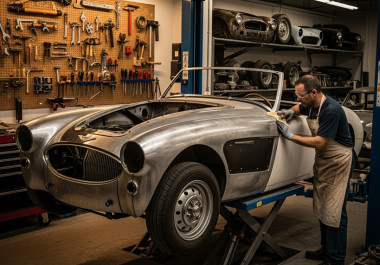Car batteries are built to last. Just as you’d expect really, given how crucial they are to the ongoing function of your car. Getting caught with a flat battery can be a nightmare when you’re out on the roads, as first of all, it automatically means that your car isn’t going anywhere until it’s got some charge in it again. Thankfully, that’s what your alternator is there for – charging your battery on the go.
Of course, batteries do have a finite lifespan, so they will eventually need replacement. (Indeed, our own online car auctions are often a great place to find them!) So, you’re probably wondering, exactly how long does it take before you might have to consider that?
How long does a car battery last?
On average, a car battery lasts between three and five years. It’s worth noting, though, that this lifespan can vary, depending on several factor – some of which are within your control, and some of which very much aren’t. Here, we’ve rounded up a couple of the most influential ones
Your driving style
Put simply, short trips and infrequent driving can be detrimental to your battery. We’ve already explained the role of your alternator, above, and when you only drive short distances, your alternator may not have enough time to fully charge the battery. That can lead to a gradual depletion of battery power over time. Obviously, there’s a relatively easy way to mitigate this, which is to try to take your car for longer drives periodically to ensure the battery remains fully charged.
Extreme weather conditions
Both extremely hot and cold weather can impact your battery’s performance. We don’t see a lot of it in the UK, but it does happen in the depths of winter or summer – and of course, some areas (such as mountainous regions) can sometimes see more seasonal extremes than city centres, for example.
High temperatures can cause the battery fluid to evaporate, leading to a reduced battery life, while cold temperatures can slow down the chemical reactions inside the battery, making it harder for the battery to start your vehicle. That’s why it’s particularly important to keep an eye on it during the winter – you might want to consider using a battery blanket if you live in particularly cold areas.
Electrical load
This is one that tends to catch a lot of people out! The more electrical accessories in use, such as heated seats, high-powered audio systems, or additional lighting, the more strain it essentially puts on your battery. Excessive use of these accessories, particularly while the engine is off, can lead to a faster battery drain. Of course, that’s not to say that you can’t use these while you’re driving the car, or even every so often when its stationary. But you’ll just want to avoid using them repeatedly for an extended period over the long term, as that’s the kind of thing that can ultimately start to affect your battery life.
Alternator performance
We’ve already touched upon the crucial role that your alternator plays several times now, so we won’t go into exhaustive detail here. Basically, if the alternator is not functioning properly, it can lead to insufficient charging of the battery, causing it to go flat more quickly. Regular checks of the alternator’s performance and its connection to the battery can help ensure that it’s providing the necessary charge to keep the battery in good condition.
Battery maintenance
As with so many other elements of your car, regular maintenance can make a big difference. In this case, it can really help to extend the life of your battery. This includes checking the battery terminals for corrosion, ensuring they are clean and tightly connected, and checking the battery charge regularly. And of course, if your car’s electrical system is not functioning correctly, it can place extra strain on the battery. It’s always a good idea to have your battery and charging system inspected by a professional if you notice any issues.
What can I do when my battery goes flat?
If you find yourself with a flat battery, the first step is to try jumpstarting it. For this, you'll need a set of jumper cables and another vehicle with a charged battery (sometimes it’s this second one that can be the tricky bit). Make sure to connect the cables correctly – positive to positive terminals and negative to a suitable grounding point – then start the second vehicle. Give it a moment, and try and start your car. Once your vehicle is running, drive for a while to allow the alternator to recharge the battery. If this method doesn’t work, or your battery frequently fails to hold a charge, it might be time for a replacement.
You can sometimes tell by a couple of tell-tale clues. For example, look for signs such as corrosion on the terminals, dim headlights, or difficulty starting the engine. And of course, when you’re picking out a new battery, take a moment to ensure it matches your vehicle’s specifications. If you’re unsure or unable to resolve the issue yourself, you can always ask a professional mechanic, who should be able to help.
And of course, if you’re looking for a second-hand car – or a salvage car you can take to pieces for spare batteries and other useful parts – well, you’re in exactly the right place. Here at RAW2K, we update our online car auctions daily and weekly. We also include makes and models available from some of the world's leading manufacturers and, as we know now, firm public favourites like Volkswagen, Ford, Renault, and many more. Why not take a look at our online car auctions, and see what you can find?




